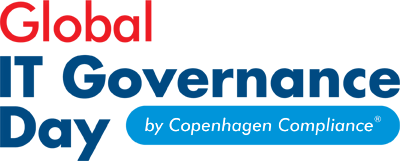Global IT Governance Day occurs every year on the third Thursday in February. Global Information Governance Day aims to raise awareness of the many components of Information Governance.
On February 18th, 2025, the IT Governance Day from 13:00-17:00 CET will focus on the following issues.
- Raise the profile of IT in the organisation.
- Integrate and align IT with organisational goals and strategy.
- How can IT Governance support performance in regulatory compliance?
- Help convert strategic goals into IT projects.
- Reduce IT risks
- Assistance in IT strategic planning.
- Help in performance measurement.
Information governance is the annual event to assess the achievement (organising, structuring, execution, enforcement and embedding) of the evaluation of appropriate and timely IT behaviour. For example, the IT processes of creation, use, archiving, and deletion of corporate data and information.
IT Governance components specify decisions, rights, and accountability activities to encourage desirable conduct in the assessment, design, databases, processes, storage and deletion of data and information. It includes the procedures, roles, standards, and metrics that ensure the effective and efficient use of data and information in enabling an organisation to achieve its goals.
This year’s IT Governance Agenda
IT Governance goes beyond retention and disposition to include privacy, access controls, data protection and other compliance issues. When electronically stored information is searched for relevant data, Information Governance provides the controls on how this content is held and controlled for easy retrieval. It also provides a platform for defensible disposition, risk and compliance. Metadata is often accompanied and stored electronically to structure significant amounts of regular and sensitive data.
Records management deals with the retention and disposition of records. A document can either be a physical, tangible object or digital information such as a database, application data, and e-mail.
The lifecycle was historically viewed as the point of creation to the eventual disposal. As content generation exploded in recent decades and regulations and compliance issues increased, traditional records management failed to keep pace.
IT Platform. A more comprehensive platform for managing records and information became necessary to address all lifecycle phases, which led to the advent of information governance.
The above three areas provide additional considerations beyond traditional records management when IT Governance emerges as a platform for organisations to define policies at the enterprise level across multiple jurisdictions.
IT Governance then also provides the enforcement of these policies into the various repositories of information, data, and records.
The Global IT Governance Day will provide a growing corporate digitisation trend. One of the many components will be the theme of the annual focus to create awareness amongst all stakeholders.


